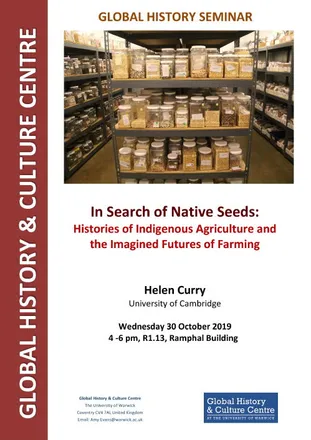Events and Activities in the Global History and Culture Centre: Calendar
For details of the past events and activities, please see the Archive of Events and Activities in the Global History and Culture Centre.
Wednesday, October 30, 2019
-Export as iCalendar |
Global seminar '‘In Search of Native Seeds: Histories of Indigenous Agriculture and the Imagined Futures of Farming'R1.13 Ramphal BuildingA global history seminar by Helen Curry, University of Cambridge Various disciplines have sought in recent decades to develop accounts of the agricultural practices of indigenous peoples. These include ethnobotany, |

 agroecology, and agricultural anthropology. Since the 1980s this research has often been linked to conservation work, for example in promoting a return to earlier farming methods or tools as means of maintaining biodiverse forests or preventing soil erosion. In this talk I explore the influence of research on indigenous agriculture on the conservation of global crop diversity. Drawing on the example of maize (corn) in the Americas, I show how social scientists developed new narratives about the past and present of indigenous and peasant farming, and used these to sustain arguments about the most desirable futures for farming, both within and beyond indigenous communities. Their accounts of both the past and the future of agriculture centered on particular crop varieties: the locally adapted varieties, or landraces, thought to have been traditionally cultivated but widely understood to be endangered as a result of agricultural intensification. As a result, the research of ethnobotanists and agroecologists contributed to new interest in and approaches to protecting those same varieties, in the process linking local acts of cultivation with global conservation concerns.
agroecology, and agricultural anthropology. Since the 1980s this research has often been linked to conservation work, for example in promoting a return to earlier farming methods or tools as means of maintaining biodiverse forests or preventing soil erosion. In this talk I explore the influence of research on indigenous agriculture on the conservation of global crop diversity. Drawing on the example of maize (corn) in the Americas, I show how social scientists developed new narratives about the past and present of indigenous and peasant farming, and used these to sustain arguments about the most desirable futures for farming, both within and beyond indigenous communities. Their accounts of both the past and the future of agriculture centered on particular crop varieties: the locally adapted varieties, or landraces, thought to have been traditionally cultivated but widely understood to be endangered as a result of agricultural intensification. As a result, the research of ethnobotanists and agroecologists contributed to new interest in and approaches to protecting those same varieties, in the process linking local acts of cultivation with global conservation concerns.